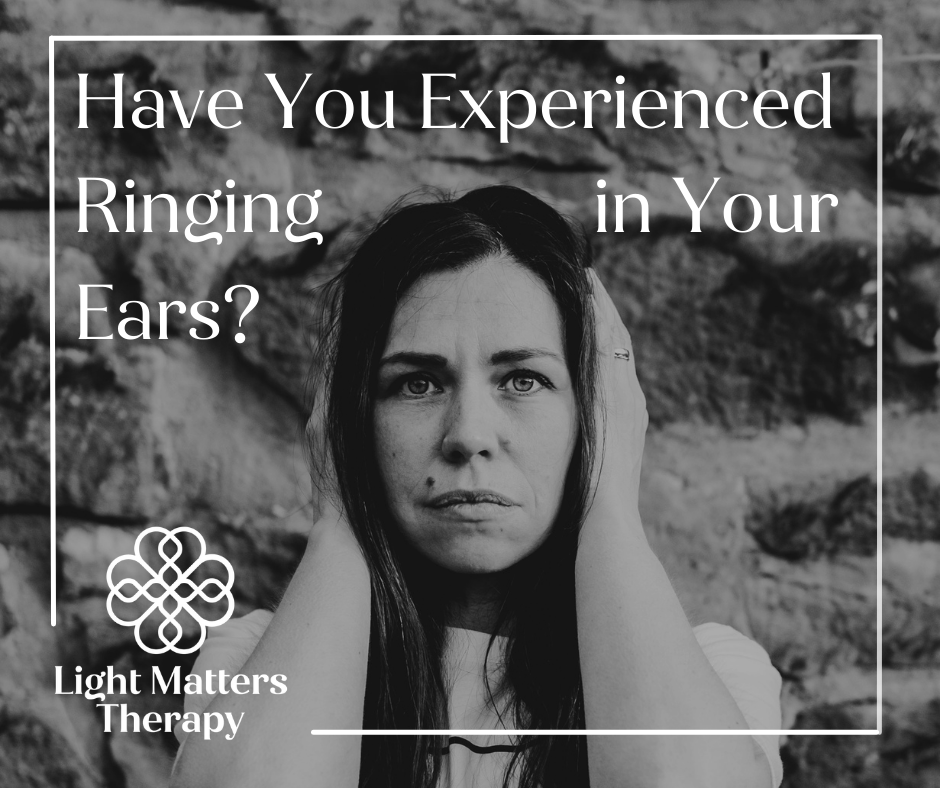Light Therapy & Tinnitus - Have you experienced a ringing in your ears?
- Lisa Chadsey
.jpg/v1/fill/w_320,h_320/file.jpg)
- Sep 29, 2022
- 4 min read

Have you experienced a ringing in your ears?
When I’m thinking about what to send out to you each week, I often think about what I’m hearing the most from my clients. What things are they experiencing that I can help with?
Recently, I’ve been hearing a lot about Tinnitus. At first it surprised me how many people mentioned it. Once I thought more about it I realized that it may be a lot more common than I imagined. Heck, I even dealt with it for awhile.
I spent time looking into it and was blown away, Tinnitus actually affects 15-20% of people. That’s one in five people! It’s more common in older adults, but with kids listening to loud music it’s becoming an even bigger problem early on.
Now, if you’re like me you might be wondering, what exactly is Tinnitus?
“Tinnitus is when you experience ringing or other noises in one or both of your ears. The noise you hear when you have tinnitus isn't caused by an external sound, and other people usually can't hear it.” (Article 1.)
This is usually a symptom to an underlying cause that is typically age-related or an injury within your circulatory system. That’s where light therapy comes in!
If you are hearing phantom noises, then you might hear abnormal (Article 1):
Buzzing
Roaring
Clicking
Hissing
Humming
Having Tinnitus can often lead to increased stress, sleep problems, issues with focus, headaches, and memory problems.
At what point should I consult my doctor?
As a whole, many people experience mild tinnitus and aren’t bothered by it. However, if it’s something that disrupts your life, you’ll want to speak with a doctor right away. Here is what you should look for (Referenced from article 1.):
If you develop tinnitus after a respiratory infection (like a flu or cold) and your tinnitus doesn't improve within a week.
You experience hearing loss or dizziness
You are feeling more anxiety or depression than normal
What can cause or exacerbate Tinnitus?
Hearing loss (early onset)
Ear infection or ear canal blockage
Head or neck injuries
Medications
How does light therapy help with Tinnitus?
Here are two core things that happen during a Low-Level Light Therapy session that help with Tinnitus:
It reduces inflammation within your body, allowing it to clear out toxins, remove built-up cellular waste, and infection to allow for your body to naturally circulate as it needs to. It also supports healthy blood flow to areas of your body, like your immune system and inner ear canal, to remove waste and to stimulate healing, increase tissue oxygenation, and increase antioxidants. With tinnitus and hearing loss, this ability to remove waste and promote healing increases the longevity of your body's hearing.
When your body absorbs red/near-infrared light energy, it simulates a photochemical reaction within your mitochondria that increases ATP production and cell signaling. Basically, it gives your body the energy it needs to regulate itself and focus its efforts on healing and repairing the damage that occurs by your body fighting itself. Red light therapy is a regenerative medicine treatment that uses different types of light to stimulate new growth of nerves and tissue and help relieve pain. When it comes to your ears, this still applies. Let the wavelengths give your body the energy it needs to repair and support the organs and parts that make hearing possible.
What does science say?
There was a double blind study that was performed with a group of 46 people. During this test LLLT (low-level light therapy) was applied for 10 days, once per day. Those in the study were asked questions about their experience with tinnitus each day and were also followed up with a month after the study to see if their results had changed.
The results of this study showcased positive results with LLLT improving symptoms of tinnitus. “There were statistically significant differences in the [LLLT] diode laser groups, but no difference in the placebo group.” (Article 2.)
This means that those who were on a placebo (a substance provided to a patient that the physician believes has no specific pharmacological effect on the condition being treated) didn’t experience change, but those who actually received light therapy did see a reduction in their tinnitus symptoms.
More and more research is being opened up in regards to light therapy and tinnitus. I’ll keep you in the loop as I hear more!
As for my personal experience, I no longer suffer from Tinnitus.
Are you tired of the ringing? Do you want to reduce the tinnitus symptoms that you’re experiencing? If so, you know I’m here for you!
Call me at 720-219-2990 and let's talk more.
Lisa Chadsey
_____________________________________________________________________________
If you want to learn more about Light Therapy & my Light Therapy work, you can follow me with the links below, or email me at Lisa@lightmattersinfo.com - thank you for reading!
Instagram | Lightswithlisa
Facebook | Light Matters Therapy
Youtube | Lights With Lisa
Here are the articles I've referenced above:
If you liked this article you can also read:
#tinnituslightherapy #lowlevellighttherapywavelengths #lighttherapywavelengths #lighttherapyhistory #lighttherapytinnitustreatment #howdoeslighttherapyheal #lighttherapymentalhealing #whylightherapyexists #feelnormalagain #healyourself #helpingthebodyhealitself #whatislighttherapy #learnaboutlights #learnaboutlighttherapy #canlightsheal #lighttherapy #healinglights #healyourself #modernmedicine #lightsthatheal #lightmatters #lightswithlisa #livinghealthy #howtoheal #healing #heallovedones #lighttherapyhealingneuropathy #lightswithlisayoutube #homeopathy #livingwell #thelighttherapytinnitus #parasympathetic #lighttherapywavelengthscience





Comentários